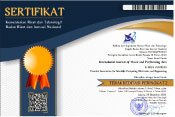(2) Yan Tu
(3) Dixian Teng
*corresponding author
AbstractThis study explores the role of indigenous musical play in promoting holistic child development through the lens of Zambian children’s game songwriting. While global early childhood music education often relies on imported songs and commercial materials, Zambian classrooms rarely incorporate local musical traditions, resulting in cultural disconnects and limited child engagement. This research addresses the urgent need to revitalize traditional children's musical games as pedagogical tools that are culturally relevant and developmentally beneficial. The primary objective of the study is to investigate how songwriting based on indigenous children’s games can be integrated into early childhood education to support cognitive, emotional, social, and psychomotor development. Using a qualitative ethnographic approach, fieldwork was conducted across three rural communities in Zambia, involving interviews with elders, teachers, and children, alongside observation and documentation of musical play practices. A selection of children's game songs was analyzed in terms of structure, meaning, and pedagogical potential. The findings reveal that traditional game songs possess rich educational value, fostering language development, emotional expression, group cooperation, and cultural identity. Furthermore, teachers expressed renewed interest and positive responses when introduced to culturally grounded teaching materials derived from children's lived experiences. The study concludes that integrating indigenous musical play into early education not only enhances learning outcomes but also strengthens the cultural continuity between school and home environments. This research contributes to the discourse on culturally responsive pedagogy and offers practical strategies for educators seeking to enrich classroom practices with locally meaningful musical resources
KeywordsMusical play; Game songs; Child development; Cultural identity; Early education
|
DOIhttps://doi.org/10.31763/viperarts.v6i2.1571 |
Article metrics10.31763/viperarts.v6i2.1571 Abstract views : 116 |
Cite |
Refbacks
- There are currently no refbacks.
Copyright (c) 2024 Mwansa Edward Chabu, Yan Tu, Dixian Teng

This work is licensed under a Creative Commons Attribution-ShareAlike 4.0 International License.
___________________________________________________________
International Journal of Visual and Performing Arts
ISSN 2684-9259
Published by Association for Scientific Computing Electronics and Engineering (ASCEE)
W: http://pubs2.ascee.org/index.php/viperarts
E: sularso@ascee.org
Organized by:
 This work is licensed under a Creative Commons Attribution-ShareAlike 4.0
This work is licensed under a Creative Commons Attribution-ShareAlike 4.0
























